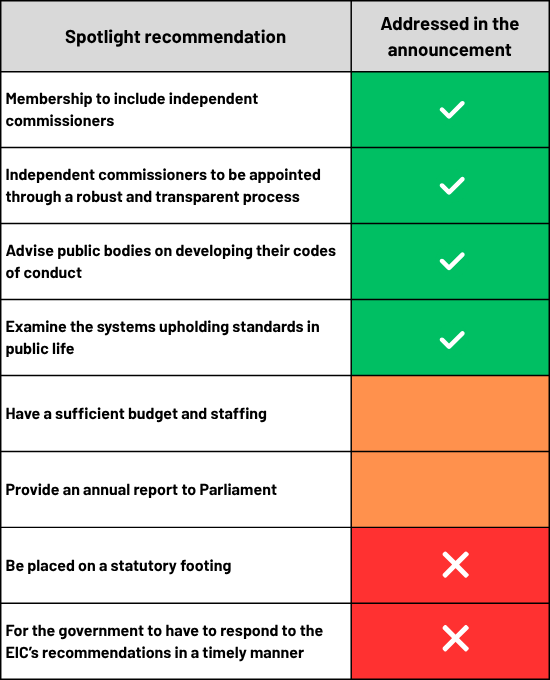Spotlight welcomes today’s official launch of the new Ethics and Integrity Commission but warns that there are serious gaps which means the body will face tough headwinds in its mission to drive up standards in UK public life and restore the public’s trust in our politics.
We particularly welcome that some key recommendations we have made are reflected in the announcement. These include that:
- The EIC will have six independent commissioners, alongside three politically selected members – this is critical to protect the non-partisan nature of the EIC.
- A robust public appointments process for the independent members, ensuring that they are free from political influence.
- Powers for the EIC to review the systems upholding standards in public life, examine concerns about the standards of conduct of all public office holders, including ministers, special advisers (spads), civil servants, parliamentarians, mayors, officers of public bodies, and public contractors.
But several of Spotlight’s recommendations remain unaddressed or only partly addressed by today’s announcement:
- No statutory footing for the EIC. This places it at serious risk of being closed down by a future government if they didn’t like its reports or recommendations.
- No commitment by the government to respond to its reports and recommendations in a timely manner. Given that the previous government took 18 months to respond to the Committee on Standards in Public Life’s Standards Matter 2 report, this issue matters.
- The EIC’s annual report should be provided to Parliament, rather than to the Prime Minister, in order to allow for proper parliamentary scrutiny and to protect the EIC’s independence from government.
- Its budget and staffing are yet to be confirmed. Without enough resources, the EIC is at risk of simply being a talking shop. With Canada’s closest equivalent organisation, the Office of the Ethics Commissioner, being made up of 50 staff in 2022-23, and France’s High Authority for Transparency in Public Life having 67 staff in 2021-22, it is clear that a fully empowered EIC must have more than a skeleton team.
Meanwhile, it is disappointing that the government has ruled out giving the Commission the power to open investigations or field complaints. There are risks that this will not meet public expectations about greater accountability for those in power.
We strongly recommend that in the longer-term serious consideration be given to the EIC having power to provide robust and direct oversight over the existing standards regulators, offer recommendations for their improvement and act as the complaints body where there are serious failings. If these standards bodies fail, the EIC should ultimately have the power to be the regulator of last resort, and have powers to investigate the most serious complaints that fall between the gaps, or cut across the remits, of multiple regulators.
Meanwhile, we remain concerned that the new arrangements for policing the Business Appointment Rules will create inconsistencies and gaps, and we urge the new EIC to review the effectiveness of the Rules and their oversight as an urgent priority. It is highly doubtful whether these rules will have robust enough deterrence without stronger and legally enforceable penalties.
Sue Hawley, Executive Director at Spotlight on Corruption, said:
“As repeated political scandals have shown, the need for effective policing of standards in public life is needed more than ever. While today’s launch of the Ethics and Integrity Commission is an encouraging step towards enhancing the development of ethical standards across the public sector, it falls a long way short of meeting recommendations made by standards experts for more robust and consistent regulation.
Without statutory powers for both the new Commission and existing standards regulators, the whole of the UK ethical regulation landscape could be dismantled in a day. There is no doubt that a future government with authoritarian tendencies would do so without a backward glance. Meanwhile, there is still no clarity on what additional resourcing and budget will be available for the EIC and other standards regulators who will be policing the revolving door.”



